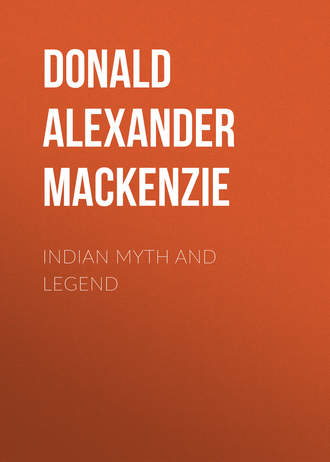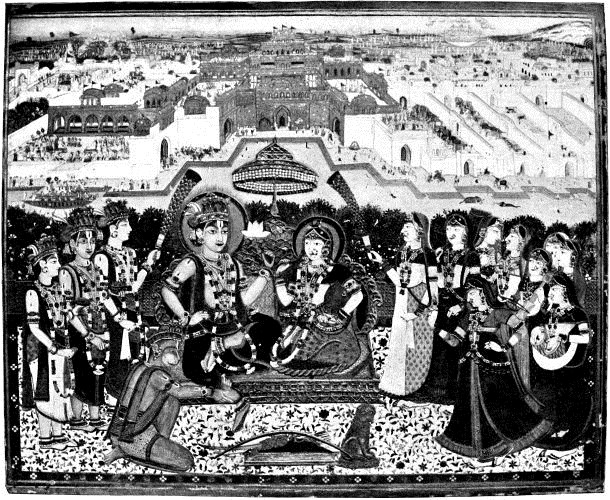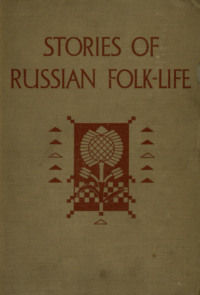 полная версия
полная версияIndian Myth and Legend
Rama meanwhile set up the Linga symbol of the god Shiva, and worshipped it on that holy island which hath since been called Ramisseram.
In five days the strait was spanned. Then Rama mounted on the back of Hanuman, son of the wind god Vayu, and Lakshmana mounted the back of Angada, son of Bali and grandson of Indra, and led the Vanar hosts across the sea. The apes and bears which composed the great attacking army leapt from island to island, shouting: “Victory to Rama!” “Victory to Lakshmana!” “Victory to Sugriva!” Now the apes were of many colours; they were white and black, green and blue, yellow and red and brown. Sugriva shone like silver, Angada resembled a white lotus; Nila, son of Agni, was red, and Hanuman was yellow as pure gold; Sarambha had also a yellow body, and Nala was green, while Darvindha had a black body, a red face, and a yellow tail. These were all leaders and great warriors of the Vanar host.
The army landed in Lanka unopposed, and encamped on a plain fronting the capital of the Rakshasa king.
The Rakshasas issued forth speedily to attack the apes, and the blowing of horns and beating of drums sounded like to the mighty thunder peals at a Yuga end. Indrajit was the Rakshasa leader. His followers rode on elephants and lions, on camels and asses, on hogs and hyenas, and on wolves; they were armed with bows and arrows, maces, spears, tridents, swords, and beams, but some had also magic weapons. Roaring and swaying, they drove forward like to long sea-rollers assaulting the shore.
The gigantic apes wielded trees for clubs and threw great boulders, but some depended on their sword-like nails and their long arrowy teeth. They rushed against the demons, shouting “Rama, Rama!” and soon the plain was covered by heaps of writhing bodies and severed limbs, while rivers of blood streamed across it from between the battling hosts. Rama looked on without fear. He reposed his faith on the apes, for he knew that they were incarnations of the gods.
The apes were driven back until Sugriva flung a great tree, which shattered the chariot of Indrajit. Then the Rakshasa leader and his army took flight.
Indrajit obtained a new chariot by offering up in sacrifice a black goat, and returning to the battlefield with his forces he shot arrows at Rama and Lakshmana. Then he threw a serpent noose, which bound the two brothers so that they were unable to move. Great was their peril, but Vayu, god of wind, sent to their aid the great Celestial bird Garuda, the serpent killer, and the snakes which formed the noose fled from before it, whereat the brethren, who had meantime fallen in a swoon, rose up again. Ravana then came forth, but Rama shot arrows which swept the ten crowns from his ten heads, and he retired in his shame and skulked in the city.
The Rakshasas were in desperate straits and bethought them to awaken Kumbha-karna, the mightiest of all the demons. In former days he had terrorized the Universe; he continually devoured human beings, and had defeated Indra even, but Brahma intervened and decreed that he would sleep for six months and then awaken for one day only. Each time he awoke he devoured a great meal, after which he was again overpowered by slumber.
Thousands of men danced and shouted and blew trumpets beside the great sleeper, but he could not be wakened; elephants were driven over his body, yet he never moved; then beautiful women came and caressed him, and he suddenly opened his eyes and roared like to the sea. His eyes were red with anger, and he cried: “Why have I been awakened before my time?”
The Rakshasas informed Kumbha-karna of the army which surrounded the city, and they brought him much food; greedily he swallowed swine and deer and many human beings and drank rivers of wine. Refreshed, but not yet satisfied, he arose and said: “Where are the apes so that I may devour them?”
He mounted his chariot and went forth to battle. The apes trembled to behold him and fled panic-stricken.... Sugriva rallied them quickly, and then they began to fling trees and boulders, but these were all splintered to pieces on the limbs of the giant. He defeated Hanuman, and seized Sugriva and carried him off in his chariot. Thousands of apes were devoured by the mighty Rakshasa.
At length Kumbha-karna went against Rama and a fierce conflict ensued, but in the end Rama discharged flaming arrows and severed his head from his body. The monster staggered backward and fell into the ocean, and great billows arose and tossed angrily in the midst of the swollen deep.
Indrajit thereafter offered up another sacrifice and secured fresh weapons. Rendering himself invisible, he rose high in the air and showered arrows like rain until Rama and Lakshmana, who were grievously wounded, fell down and pretended to be dead.
When darkness came on, Hanuman and Bibhishana surveyed the battlefield with torches and found that many apes had been wounded and slain. Great was their sorrow, but Sushena, the ape physician, bade Hanuman to hasten to a certain Himalayan mountain to obtain healing herbs. The wind god's son assumed tremendous bulk, and, leaping aloft, went speedily through the air until he reached the place where the herbs grew. He searched for them in vain; then he tore up the mountain, and carrying it in his hand returned again to the battlefield. The physician soon discovered the herbs; then he gave healing to Rama and Lakshmana and the wounded apes, who rose up at once ready and eager to fight as before. Hanuman returned with the mountain and restored it to its place.
When the sun rose, Ravana sent forth young heroes to battle against the apes and bears, but they were all slain. Then Indrajit came to avenge the fallen, but Lakshmana drew his bow and shot an arrow which Indra had given to him. Unerring was his aim, and Indrajit was struck down; his body rolled headless upon the plain.
Ravana lamented for the death of his son, crying: “He was the mightiest of my heroes and the dearest to my heart. All the gods feared him, yet by a mortal was he laid low.... O my son, thy widow wails for thee and thy mother weeps in sore distress. Fondly I deemed that when the frailties of old age afflicted me thou wouldst close mine eyelids in death, but youth is taken first and I am left alone to battle against mine enemies.”
For a time the mighty demon wept; then he arose in wrath to wreak vengeance. First of all he hastened towards the Asoka grove to slay Sita. But the Rakshasa dames concealed the wife of Rama, and prevailed upon Ravana not to pollute his fame by slaying a woman. One cried to him: “Auspicious is the last day of the waning moon. The hour of thy vengeance is nigh. Turn thee towards the battlefield and great glory will be thine.”
Ravana went gloomily away; he mounted his chariot to battle against his enemies, remembering those who had already fallen. Followed by a great army, he swept from the city like to a tempest cloud which darkens the summer heaven. He beheld his brother Bibhishana fighting for Rama, and angrily cast at him a great weapon, but Lakshmana flung a javelin which shattered it in flight. Ravana smiled grimly and shouted to Lakshmana: “Slayer of my son, I welcome thee! Thou hast protected Bibhishana; now protect, if thou canst, thine own self.”
Having spoken thus he flung a great dart, which pierced the heart of Lakshmana and pinned him to the earth.
Rama stooped over the fallen hero and cried: “Alas! art thou fallen, my gallant brother? Thy weapons have dropped from thy hands; death claims thee, but, O Lakshmana, thou wilt not die alone. I am weary of battle and of glory, and when my task is ended, I will follow in thy footsteps.... The love of wife or friend is easily won, but the love of a faithful brother, equal to thine, is rarely found in this world of illusions.... Dearest of brothers, greatest of heroes, wilt thou never awaken from thy deathly swoon or open again thine eyes to behold me?… Alas! the lips of Lakshmana are silent and his ears are stopped.”
In the darkness of night Hanuman again hastened northward in speedy flight to obtain the mountain which he had aforetime carried to Lanka. The physician found upon it the healing herbs; he pounded them and made a paste which he placed under the nostrils of the unconscious warrior. Then Lakshmana rose up again healed and hale and powerful. Rama rejoiced greatly, and turned against his foes.... A night attack was made upon the Rakshasa capital, and the Apes intercepted a sacrifice which Ravana sought to offer up to the gods so as to compel their aid; many fair mansions were given to the flames.
When day came Ravana went forth to battle. Surpa-nakha, his sister who had caused the war, stood in his way, and he thrust her aside impatiently, whereat she cursed him, saying: “For this thou wilt never again return to the city.”
Ravana drove on in battle fury, his heart filled with hatred for his foes and with sorrow for the fallen. Rama went against him in the chariot of Indra, and for a time a dubious conflict was waged. The earth trembled and the ocean shook with fear.
Suddenly Rama darted forward. He drew his bow and shot a swift arrow, which smote off one of Ravana's ten heads, but immediately another appeared in its place.347 Then the hero seized the flaming weapon which Brahma had created for the protection of the gods; with unerring aim he discharged it in flaming splendour; it struck the demon; it cleft in twain his heart of iron. Roaring in his fierce agony Ravana fell ponderously upon the plain and immediately expired. So was the enemy of gods and men put to death by peerless Rama.
Celestial music was heard in heaven and flowers fell upon the plain of victory: a voice came down the wind, saying: “O victor of truth and righteousness, thy task is now ended.”
The Rakshasa hosts broke in flight when Ravana fell, and Rama entered the city in triumph. Bibhishana burned the body of his fallen brother, and performed the funeral rites. Thereafter he was proclaimed King of Lanka.
When peace was restored, Rama commanded that Sita should be brought forth. She was carried towards the plain concealed in a litter, and all the Apes gathered round to behold her, whereat Rama requested her to alight and walk towards him, and she did so. With folded hands she approached her husband and knelt at his feet, weeping tears of joy.
Clouded was the brow of Rama; he spoke sternly, and said: “Mine enemies are slain, and thou art delivered from captivity, O Sita; but now that my shame is removed I have no desire to behold thee. I cannot receive thee as my wife, because that thou hast dwelt in the house of Ravana.”
Said Sita: “Chaste and innocent have I remained.... O Rama, if thou hadst informed me of thy doubt, I would have died ere now. Better is death than thy dark suspicion.”
Addressing Lakshmana, she then said: “Build for me a funeral pyre so that I may end my grief amidst the flames.”
As she desired so did the brother of Rama do. He built the pyre and set it alight. Then Sita invoked Agni:
If in act and thought, she uttered, I am true unto my name,Witness of our sins and virtues, may this fire protect my fame!If a false and lying scandal brings a faithful woman shame,Witness of our sins and virtues, may this fire protect my fame!If in lifelong loving duty I am free from sin and blame,Witness of our sins and virtues, may this fire protect my fame!R. C. Dutt's trans.
32
THE CORONATION OF RAMA AND SITA
Fearlessly she then leapt amidst the flames and vanished, while all lamented around her. Rama cried: “This day have I sinned, because she is innocent.”
In that hour a great wonder was wrought. Suddenly the Deva-rishis and Gandharvas and the gods appeared in the air. At the same time the red flames of the mighty pyre were divided, and the god Agni came forth with Sita, whom he delivered to Rama, saying: “Receive thy wife who is without sin or shame.”
Rama embraced Sita, and said: “I have never doubted her virtue; she is without sin, and now her purity has been proved before all men.”
He wept, and Sita hid her face in his bosom and soft embrace.
The exile of Rama was now ended, and he returned speedily in the car of Indra to Ayodhya, with Sita and Lakshmana and Hanuman.
Bharata welcomed his elder brother, and laid the sandals at his feet, saying: “These are the symbols of thy rule, O Rama; I have guarded the throne for thee. Now take thy crown and govern thy kingdom. I give thee back thine own.”
Rama was crowned on the morrow amidst the rejoicings of the people, and prosperity returned once again to the kingdom.
Time went past, but the sorrows of Sita were not ended. The people whispered against the fair queen, doubting her virtue, because that she had been taken away by Ravana, and they wondered Rama had received her back. At length her husband, yielding to the wishes of his subjects, banished the innocent queen from the kingdom. The faithful Lakshmana conducted her towards the southern jungles, and abandoned her nigh to the hermitage of Valmiki, counselling her with tears to take refuge with the saintly poet.
Valmiki received her with pity, and soon afterwards she gave birth to two sons, who were named Lava and Kusa.
Sixteen years went past, and Rama's mind was troubled because that he had slain Ravana, who was the son of Pulastya, the Rishi. So he resolved to perform the Aswamedha (horse sacrifice) to cleanse his soul of sin.
The horse was sent forth to wander through the land, and when it approached the hermitage of Valmiki, Lava and Kusa, the sons of Rama and Sita, took possession of it. They defeated the royal army and wounded Satrughna. Lakshmana hastened forth with another army, but he was also grievously wounded and defeated by the young heroes. Then Rama himself went southward to wage war and recapture the horse. When his sons came forth against him, Rama wondered to find that they were so like to himself in countenance and bearing; his heart was filled with tenderness, and he asked them: “Whose children are you?”
Lava and Kusa greeted him with reverence, and said: “Sita is our mother, but we know not the name of our sire.”
Then Rama perceived that the lads were his own sons.... Valmiki, the sage, came towards him, and Rama said: “The people spoke evil things against Sita, and it was necessary to prove her innocence. Now let her be taken into my presence, for I know that these noble children are mine.”
Valmiki returned to Sita and asked her to go with him before Rama, but for a time she refused to do so. The sage pleaded with her, and at length she walked forth from the hermitage with downcast eyes and hands uplifted. In the presence of Rama and the people she then invoked the Earth, and cried:
If unstained in thought and action I have lived from day of birth,Spare a daughter's shame and anguish and receive her, Mother Earth!If in duty and devotion I have laboured undefiled,Mother Earth! who bore this woman, once again receive thy child!If in truth unto my husband I have proved a faithful wife,Mother Earth! relieve thy Sita from the burden of this life!R. C. Dutt's trans.When she had spoken thus, all who heard her wept and sorrowed. And while they gazed upon her with pity and tenderness, the earth suddenly yawned, and from its depths arose a golden throne sparkling with gems and supported by four great serpents, as a rose is supported by green leaves. Then the Earth Mother appeared and hailed Sita with loving words, and led her to the throne, on which she seated herself beside her sinless daughter, the faithful and undefiled wife of Rama.... The throne thereafter vanished and the earth closed over it.
So passed Sita from before the eyes of all mankind. Rama flung himself upon the ground in an agony of sorrow. But Brahma appeared and spake to him, saying: “Why dost thou despair, O Lord of all? Well thou knowest that life is but a dream, a bubble of water....”
Rama, however, even after the Aswamedha had been performed, continued to mourn until the Celestial bird Garuda came for him: then he ascended to heaven, as Vishnu, and found Sita, who was the goddess Lakshmi, the incomparable Sri.
So endeth the story of Rama, whose fame can never die.
1
Romesh C. Dutt's Ramáyana dedication.
2
Rydberg's Teutonic Mythology.
3
The Races of Europe, W. Z. Ripley, p. 481.
4
The Races of Europe, W. Z. Ripley, p. 17.
5
Biographies of Words and the Home of the Aryas, pp. 120 and 245.
6
The Descent of Man, Charles Darwin, chap. vi, p. 155 (1889 ed.), and The Ancient Egyptians, G. Elliot Smith, pp. 63, 64 (1911).
7
Muir's Original Sanskrit Texts, vol. 1, p. 140.
8
The Tribes and Castes of Bengal, H. H. Risley, vol. 1, xxxi.
9
ibid. xxxii-xxxiii.
10
The People of India, H. H. Risley, p. 59.
11
The Races of Europe, W. Z. Ripley, 450 et seq.
12
The Races of Europe, W. Z. Ripley, p. 451.
13
Man, Past and Present, A. H. Keane, p. 270.
14
The Wanderings of Peoples, A. C. Haddon, p. 21.
15
Vedic Index of Names and Subjects (1912), p. viii.
16
A convenient term to refer to the unknown area occupied by the Vedic Aryans before they invaded India.
17
Vedic Index of Names and Subjects, A. A. Macdonell and A. B. Keith, Vol. I, pp. 8, 9 (1912).
18
Compared with the Latin atrium, “the room that contained the hearthfire”. Agni is cognate with the Latin ignis, cf. Lithuanian, ugnis szwenta, “holy fire”—Early Religious Poetry of Persia, Professor Moulton, pp. 38, 39.
19
The theory that certain Babylonian graves show traces of cremation has been abandoned.—A History of Sumer and Akkad, L. W. King, pp. 20, 21 (1910).
20
A Journey in Southern Siberia, Jeremiah Curtin, p. 101.
21
The Dawn of Mediterranean Civilization, A. Mosso, London Trans., 1910.
22
British Museum Guide to the Antiquities of the Bronze Age, pp. 23, 24.
23
Associated, some authorities urge, with Germans from the mouth of the Elbe.
24
The Dawn of History, J. L. Myres, p. 199.
25
British Museum Guide to the Antiquities of the Bronze Age, p. 98.
26
British Museum Guide to the Antiquities of the Early Iron Age, p. 8.
27
ibid. p. 6.
28
ibid. p. 8.
29
British Museum Guide to the Antiquities of the Bronze Age, pp. 16, 17.
30
Egyptian Myth and Legend, p. 143.
31
Campbell's West Highland Tales, vol. iii, p. 55.
32
A History of Civilization in Palestine, R. A. S. Macalister.
33
The Discoveries in Crete, Professor R. M. Burrows, p. 100. Dating according to Crete the Forerunner of Greece, C. H. and H. B. Hawes, p. xiv.
34
Vedic Index of Names and Subjects.
35
See Egyptian Myth and Legend.
36
The North-Western Provinces of India, 1897, p. 60.
37
Ethnology in Folklore, George Laurence Gomme, p. 34 et seq.
38
A History of Sanskrit Literature, p. 115.
39
See Egyptian Myth and Legend.
40
The “Golden Age” of the gods, and the regeneration of the world after Ragnarok, do not refer to the doctrine of the world's ages as found in other mythologies.
41
Lay Morals.
42
2 Kings, v, 18.
43
One of the sections of the epic Mahabharata is called “Go-Harran”, which signifies “cattle harrying”.
[47] Like the giants and demons of Teutonic mythology, who fought with the gods in the Last Battle.
44
The deified poets and sages. See Chapter VIII.
45
Adolf Kaegi says: “Also Vadha or Vadhar”, which he compares with German, Wetter; O.H. German, Wetar: Anglo-Saxon, Weder; English, Weather. The original word signifying the sudden change in atmospheric conditions caused by the thunderstorm was ultimately applied to all states of the air.
46
Roy's translation of Mahabharata.
47
Like the giants and demons of Teutonic mythology, who fought with the gods in the Last Battle.
48
Like the giants and demons of Teutonic mythology, who fought with the gods in the Last Battle.
49
The Religion of Babylonia and Assyria, by T. G. Pinches, LL.D.
50
Cosmology of Rigveda, Wallis.
51
Religion of the Ancient Egyptians, Professor A. Wiedemann, p. 137.
52
Rigveda, iv, 34. 9.
53
Cosmology of Rigveda, Wallis.
54
A History of Sanskrit Literature, pp. 106, 107.
55
Rigveda, ii, 53; iii, 55.
56
Teutonic Myth and Legend, pp. 35-9.
57
The Religion of Babylonia and Assyria, T. G. Pinches, LL.D.
58
An old Germanic name of Odin related to Divus. Odin's descendants were the “Tivar”. (Pronounce Dyaus as one syllable rhiming with mouse.)
59
Rigveda, iv, 18. Wilson, vol. iii, p. 153.
60
The Laws of Manu, ix, 8; p. 329. (Sacred Books of the East, vol. xxv.)
61
Adi Parva, sect. lxxiv of Mahabharata, Roy's translation.
62
See Egyptian Myth and Legend.
63
The Satapatha Brahmana, translated by Professor J. Eggeling, Part I, pp. 369, 373. (Sacred Books of the East, vol. xii.)
64
Arrowsmith's translation.
65
Teutonic Myth and Legend, p. 173.
66
Vana Parva section of Mahăbhărata, sect. xliii, Roy's translation.
67
Rigveda, v, 2.
68
Rigveda, i, 95.
69
Rigveda, iv, 6. 8.
70
Rigveda, iii, 23. 3.
71
Rigveda, i, 95. 4, and note, Oldenberg's Vedic Hymns (Sacred Books of the East, vol. xlvi).
72
Teutonic Myth and Legend, pp. 16 and 187-9.
73




